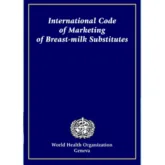29 April 2022
This WHO report details how the $55billion infant formula industry uses pervasive, personalised and powerful methods to target parents, manipulate scientific claims, and undermine parents’ confidence.
Titled ‘Scope and impact of digital marketing strategies for promoting breastmilk substitutes’, the report reveals the exploitative marketing practices used by the infant formula industry to influence families’ infant feeding choice and offers an investigation into how new mothers are being targeted with personalised social media content which is often not recognisable as advertising.
The World Health Organization (WHO) calls on the baby food industry to end exploitative infant formula marketing and urges governments to protect children and families by enacting, monitoring, and enforcing laws and guidance to end all promotion of infant formula products, including the International Code of Marketing of Breastmilk Substitutes (the Code), a public health agreement designed to protect the general public and mothers from aggressive marketing practices.
Dr Francesco Branca, Director of the WHO Nutrition and Food Safety department said, “The promotion of commercial milk formulas should have been terminated decades ago. The fact that formula milk companies are now employing even more powerful and insidious marketing techniques to drive up their sales is inexcusable and must be stopped.”
Key findings from the report include:
- Digital marketing is becoming the dominant form of marketing in many countries. In some countries more than 80% of exposure to breastmilk substitutes advertisements occurs online.
- Digital marketing increases breastmilk substitutes sales and occurs across multiple online channels and social media platforms in every country.
- Breastmilk substitutes companies buy direct access to pregnant women and mothers in their most vulnerable moments from social media platforms and influencers. They use apps, babyclubs, advice services and online registrations to collect personal information and send personalised breastmilk substitutes promotions to mothers.
- Breastmilk substitutes companies use strategies that aren’t recognisable as advertising, such as online baby-clubs, advisory services, social media influencers, and user-generated content.
- Breastmilk substitutes brand accounts post content on social media around 90 times per day and these reach three times as many people as informational posts about breastfeeding.
- Digital marketing can evade scrutiny from enforcement agencies. New approaches to Code-implementing regulation and enforcement are required.
To read the full report visit WHO’s website.
Learn more
- Guidance on regulatory measures aimed at restricting digital marketing of breast-milk substitutes (2023)
- ‘How marketing of formula milk influences our decisions on infant feeding’ – see the Baby Friendly news page.
- 2016 Call to Action campaign launched to protect the public from harmful and misleading marketing. As a result of this campaign in 2019, Channel 4 Dispatches explored how powerful multi-national companies have been pushing the boundaries of existing legislation to promote their products.
- For in-depth information on infant formulas in the UK, please visit First Steps Nutrition Trust.







